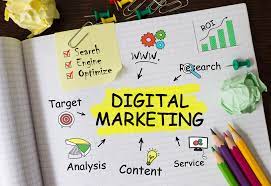The Power of Digital Marketing and Analytics
In today’s digital age, businesses are leveraging the power of digital marketing and analytics to drive growth, reach their target audience, and make data-driven decisions. Digital marketing encompasses a wide range of strategies, including social media marketing, email campaigns, search engine optimization (SEO), content marketing, and more.
One of the key advantages of digital marketing is the ability to track and measure the performance of campaigns in real-time using analytics tools. By analyzing data such as website traffic, user engagement, conversion rates, and customer behavior patterns, businesses can gain valuable insights into the effectiveness of their marketing efforts.
Analytics plays a crucial role in optimizing digital marketing strategies by identifying areas for improvement, understanding customer preferences, and predicting future trends. By harnessing the power of data analytics, businesses can tailor their marketing messages to specific target audiences, personalize customer experiences, and maximize ROI.
Furthermore, digital marketing and analytics allow businesses to adapt quickly to changing market conditions and consumer preferences. By monitoring key performance indicators (KPIs) and analyzing trends in real-time, businesses can make informed decisions that drive results and stay ahead of the competition.
Overall, digital marketing and analytics have revolutionized the way businesses connect with their customers, measure success, and drive growth. By embracing these powerful tools and harnessing the insights they provide, businesses can create more targeted campaigns, improve customer engagement, and achieve sustainable long-term success in today’s competitive digital landscape.
Mastering the Digital Landscape: 9 Essential FAQs on Digital Marketing and Analytics Unveiled
- What is digital marketing and how does it differ from traditional marketing?
- What are the key components of a successful digital marketing strategy?
- How can businesses use social media for effective digital marketing?
- What is search engine optimization (SEO) and why is it important for digital marketing?
- How do analytics tools help businesses measure the success of their digital marketing campaigns?
- What are some common metrics used to track the performance of digital marketing efforts?
- How can businesses leverage email marketing as part of their digital strategy?
- What role does content marketing play in a comprehensive digital marketing plan?
- How can businesses utilize data analytics to optimize their digital marketing strategies?
What is digital marketing and how does it differ from traditional marketing?
Digital marketing refers to the use of digital channels and technologies to promote products or services to a target audience. Unlike traditional marketing, which relies on offline channels such as print ads, TV commercials, and direct mail, digital marketing leverages online platforms like social media, search engines, email, and websites to reach customers. The key difference lies in the ability of digital marketing to target specific audiences with personalized messages, track performance metrics in real-time, and optimize campaigns based on data-driven insights. This dynamic and interactive approach sets digital marketing apart from traditional methods by offering greater flexibility, measurability, and the ability to adapt quickly to changing market conditions.
What are the key components of a successful digital marketing strategy?
A successful digital marketing strategy comprises several key components that work together to achieve specific goals and drive results. These components include defining clear objectives and target audience, conducting thorough market research, creating engaging and relevant content, implementing effective SEO strategies, leveraging social media platforms for brand awareness and engagement, utilizing email marketing campaigns for lead generation and nurturing, analyzing data through web analytics tools to measure performance and make data-driven decisions, and continuously optimizing the strategy based on insights gained from analytics. By integrating these components cohesively, businesses can create a robust digital marketing strategy that maximizes reach, engagement, and conversion rates in today’s competitive online landscape.
How can businesses use social media for effective digital marketing?
Businesses can leverage social media as a powerful tool for effective digital marketing by creating engaging and relevant content that resonates with their target audience. By establishing a strong presence on platforms such as Facebook, Instagram, Twitter, and LinkedIn, businesses can interact with customers in real-time, build brand awareness, drive website traffic, and generate leads. Additionally, utilizing social media analytics tools allows businesses to track the performance of their campaigns, identify trends, and measure the impact of their marketing efforts. By understanding customer preferences and behavior on social media platforms, businesses can tailor their content strategy to maximize engagement and achieve their marketing goals effectively.
What is search engine optimization (SEO) and why is it important for digital marketing?
Search engine optimization (SEO) is the practice of optimizing a website to improve its visibility and ranking on search engine results pages. By strategically incorporating relevant keywords, creating high-quality content, optimizing meta tags, and building backlinks, SEO helps websites attract organic traffic from search engines like Google. SEO is crucial for digital marketing because it enhances a website’s chances of being discovered by potential customers who are actively searching for products or services related to the business. A strong SEO strategy not only increases visibility but also boosts website credibility, user experience, and ultimately leads to higher conversion rates and business growth.
How do analytics tools help businesses measure the success of their digital marketing campaigns?
Analytics tools play a crucial role in helping businesses measure the success of their digital marketing campaigns by providing valuable insights into key performance indicators (KPIs) and campaign metrics. These tools track and analyze data such as website traffic, user engagement, conversion rates, click-through rates, and return on investment (ROI). By interpreting this data, businesses can evaluate the effectiveness of their marketing strategies, identify areas for improvement, and make data-driven decisions to optimize future campaigns. Analytics tools enable businesses to quantify the impact of their digital marketing efforts, understand customer behavior patterns, and assess the overall performance of their campaigns in real-time, ultimately leading to more informed decision-making and improved results.
What are some common metrics used to track the performance of digital marketing efforts?
When it comes to tracking the performance of digital marketing efforts, several common metrics play a crucial role in providing valuable insights into the effectiveness of campaigns. Some of the key metrics include website traffic, conversion rate, click-through rate (CTR), bounce rate, cost per acquisition (CPA), return on investment (ROI), customer lifetime value (CLV), and engagement metrics such as likes, shares, comments, and time spent on site. These metrics help businesses measure the success of their digital marketing initiatives, identify areas for improvement, and make data-driven decisions to optimize their strategies for better results.
How can businesses leverage email marketing as part of their digital strategy?
Businesses can leverage email marketing as a powerful component of their digital strategy by utilizing targeted and personalized campaigns to engage with their audience effectively. By segmenting their email lists based on demographics, behavior, or preferences, businesses can deliver tailored content that resonates with recipients and drives higher engagement rates. Additionally, incorporating analytics tools to track open rates, click-through rates, and conversions allows businesses to measure the effectiveness of their email campaigns and make data-driven decisions to optimize future strategies. Email marketing enables businesses to nurture relationships with customers, promote products or services, drive traffic to their website, and ultimately achieve their marketing objectives in a cost-effective and measurable way.
What role does content marketing play in a comprehensive digital marketing plan?
Content marketing plays a pivotal role in a comprehensive digital marketing plan by serving as the backbone that drives engagement, builds brand awareness, and fosters customer trust. High-quality and relevant content not only attracts and retains the attention of target audiences but also establishes businesses as industry authorities. By creating valuable content that resonates with consumers’ needs and interests, businesses can enhance their online visibility, drive website traffic, and ultimately convert leads into loyal customers. In essence, content marketing acts as a strategic tool that fuels the success of digital marketing efforts by delivering compelling storytelling and valuable information that connects with audiences on a deeper level.
How can businesses utilize data analytics to optimize their digital marketing strategies?
Businesses can harness the power of data analytics to optimize their digital marketing strategies by leveraging insights derived from analyzing key metrics such as website traffic, customer engagement, conversion rates, and user behavior patterns. By interpreting this data effectively, businesses can identify trends, preferences, and areas for improvement in their marketing campaigns. This enables them to tailor their messaging to specific target audiences, personalize customer experiences, and make data-driven decisions that maximize the effectiveness of their digital marketing efforts. Ultimately, utilizing data analytics empowers businesses to refine their strategies in real-time, adapt to market changes swiftly, and achieve greater success in reaching and engaging with their target audience.



